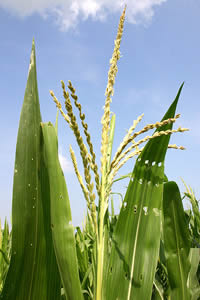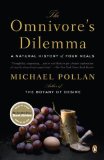 Research suggests the answer is, YES, when talking about processed foods!
Research suggests the answer is, YES, when talking about processed foods!
Just by cutting out many of the products with refined corn, switching to a healthier brand, or making the product myself, my husband and I started to lose weight. We weren’t watching calories or anything else at the time.
My husband, who has been running for 3 years, was stuck at a plateau on his weight for most of those 3 years, even though he was running 30 miles per week. Without changing anything else except getting rid of the worst of the processed products (especially those with high-fructose corn syrup — HFCS), he lost more than 10 pounds.
Just to be clear, we weren’t consuming junk foods. The processed foods I’m talking about were supposed to be healthy like yogurt, cottage cheese, and Kellogg’s Corn Flakes. Surprisingly, two of three of those products had HFCS. The other had hidden corn products. While I expect corn in my corn flakes (although not HFCS), I don’t expect or want to eat corn in my yogurt and cottage cheese.

I first discovered this weight and processed food connection when I was reading The Omnivore’s Dilemma: A Natural History of Four Meals by Michael Pollan. (Read my review “Highly Recommended: The Omnivore’s Dilemma by Michael Pollan.”)
Corn is fed to many farm animals — that were never meant to eat corn — to fatten them up quickly. So what is this doing to people?
Corn, which is considered a starchy vegetable, is really a starchy grain. By definition, starchy foods contain more energy-dense carbohydrates — more calories per volume. Therefore, when you are eating more processed foods, you will be eating more calories and/or items that affect your hormones in adverse ways, especially for people who store fat more efficiently, i.e. all us poor folks who gain weight when just looking at food. Don’t be fooled! Zero-calorie and low-calorie processed foods may actually make you gain weight.
Not only are the calories a problem, but the refined carbs get broken down in the body quickly, spiking blood sugar levels. Excess blood sugar gets stored in the body as fat, which can have a very detrimental effect on the waistline, heart and cardiovascular system, and other systems. Also, prolonged excessive blood sugar levels can lead to type 2 diabetes. See “Diabetes – Our Arteries on Corn Flakes.”
Keep in mind, too, that corn contains omega-6, a family of unsaturated fatty acids that are found in seed products. Medical research suggests that excessive levels of these omega-6 fatty acids, relative to omega-3 fatty acids (such as those found in grass-fed animal products and fish oil) may increase a number of diseases, including inflammation in the body, which is linked to “heart attacks, thrombotic stroke, arrhythmia, arthritis, osteoporosis, inflammation, mood disorders, obesity, and cancer.” (See “Omega-6 fatty acid.”) There are plenty of interesting articles about omega-3 and omega-6 fatty acids on the Internet. Check out “The Good and Bad of Omega 6 Fatty Acids” at Men’s Total Fitness.
Reading The Omnivore’s Dilemma: A Natural History of Four Meals truly opened my eyes to what I was eating. Pollan writes, “…of the 45,000 items in a supermarket, more than a quarter contain corn.” Once I started scrutinizing ingredient lists for corn products, I was horrified to learn that even many so-called healthy foods contain corn, such as Yoplait yogurt (which contains high-fructose corn syrup) and store-branded cottage cheese (which has hidden corn products.) Wow! I stopped buying these brands and switched to healthier brands, such as Daisy cottage cheese and sour cream and Dannon low-fat vanilla yogurt. Now, I’m just buying plain Greek yogurt. Hint: don’t buy yogurt with flavors, other than the low-fat vanilla yogurt from Dannon. All the flavored yogurts I’ve looked at have added sweeteners and other nasty ingredients.
Beware, as Michael Pollan points out, because corn can be hidden in some of the more difficult-to-pronounce and/or obscure ingredients: citric and lactic acid; glucose, fructose, and maltodextrin; ethanol (for alcoholic beverages as well as cars), sorbitol, mannitol, xanthan gum; modified and unmodified starches; dextrins; cyclodextrins; MSG; corn syrup; high-fructose corn syrup; lecithin; natural flavors; natural ________ flavor (fill in the blank, like raspberry); and many more.
As Pollan says, “The longer the ingredient label on a food, the more fractions of corn and soybeans you will find in it.” Try to avoid foods with ingredients you can’t pronounce. Also, if a food has more than five ingredients, especially those obscure types, you might want to purchase something else.
Now, I’m cooking almost everything from scratch, using organic foods (meat, dairy, eggs, veggies, and fruit) when possible. Believe it or not, we ate off salad plates for years, but now that I’m cooking almost exclusively with whole foods, those that are directly raised from the soil or raised by grazing on the land, we switched to eating off of dinner plates once again since we are actually eating more food. The key is that we are eating more low-density foods and better well-balanced meals.
Check back later this week for the first of several articles in my “Boost Your Metabolism” series.